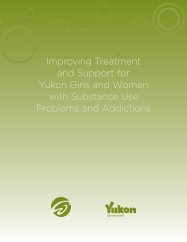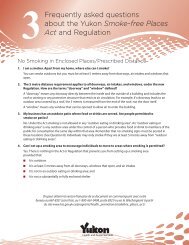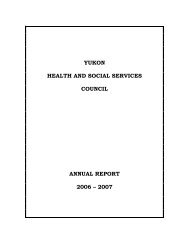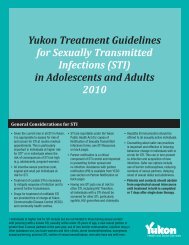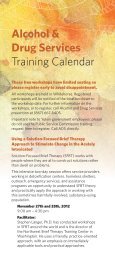Women and Alcohol: A women's health resource [2326.26 KB ]
Women and Alcohol: A women's health resource [2326.26 KB ]
Women and Alcohol: A women's health resource [2326.26 KB ]
Create successful ePaper yourself
Turn your PDF publications into a flip-book with our unique Google optimized e-Paper software.
20 <strong>Women</strong> <strong>and</strong> <strong>Alcohol</strong><br />
Drinking, Swedish style<br />
She remembers it as one of the few times<br />
in her marriage when she fought with her<br />
husb<strong>and</strong>. They were driving home when<br />
they passed something on the road. “Stop<br />
the car,” she said. “I think I saw a girl<br />
back there.” Her husb<strong>and</strong> was irritated. He<br />
was hungry. He hadn’t seen what she had.<br />
“Reluctantly, he turned the car around <strong>and</strong><br />
there it was,” says Leena Haraké. “A girl’s<br />
head was sticking out of a green garbage<br />
bag. She had been raped <strong>and</strong> killed after<br />
partying at a bar with strangers.”<br />
For Haraké, this is just one of several<br />
indelible incidents she has witnessed. A<br />
social worker <strong>and</strong> head of the <strong>Women</strong>’s<br />
Organizations Committee on <strong>Alcohol</strong> <strong>and</strong><br />
Drug Issues (WOCAD) in Stockholm,<br />
she tears up describing another incident:<br />
rescuing a baby on Christmas Eve from a<br />
home where the father had been drinking.<br />
The child’s arms <strong>and</strong> legs had been broken.<br />
He was only six months old. In her position,<br />
she has had the opportunity to follow the<br />
boy’s life. “Things did not turn out well for<br />
him,” she says.<br />
Haraké tells these stories to make a point:<br />
no country does alcohol well. Populationlevel<br />
policy interventions do not create a<br />
perfect world. In fact, no country can take<br />
credit for preventing all alcohol-related<br />
harm.<br />
Still, some try harder than others, with<br />
varying results. Sweden is one of those<br />
countries, <strong>and</strong> worth examining, given the<br />
ups <strong>and</strong> downs of policy in recent years.<br />
Most of all, the country of nine million<br />
has paid attention to alcohol consumption,<br />
advertising <strong>and</strong> availability — <strong>and</strong> paying<br />
attention is key. Says Jürgen Rehm, director<br />
of social <strong>and</strong> epidemiological research at<br />
Toronto’s Centre for Addiction <strong>and</strong> Mental<br />
Health: “Sweden is probably the best<br />
example of how a modern high-income<br />
country can keep the alcohol-attributable<br />
burden low.”<br />
Dining on tender salmon at Stockholm’s<br />
tony Wedholm Fisk restaurant, Gabriel<br />
Romanus is an eloquent teacher on the<br />
subject. Romanus spent 17 years of his<br />
adult life with his foot in one camp, as a<br />
member of parliament, <strong>and</strong> another 17 with<br />
his foot in another, as head of the successful<br />
Swedish alcohol monopoly, Systembolaget<br />
(their LCBO).<br />
Historically, Sweden has been the poster<br />
child of strong alcohol policy, based on<br />
high prices <strong>and</strong> controlled retail access.<br />
Public <strong>health</strong> is the issue. In 1985, the<br />
Swedish parliament targeted the cutting<br />
of consumption by 25 per cent, by 2000.<br />
This was followed with legislation in<br />
1991, restating a commitment to reduce<br />
consumption <strong>and</strong> alcohol abuse. That<br />
same year, the government transferred<br />
Systembolaget from the ministry of finance<br />
to the ministry of social affairs. “This was<br />
a crucial step,” says Romanus. “It served as<br />
a reminder that Systembolaget is part of the<br />
Swedish public <strong>health</strong> policy.”<br />
Sweden is the best<br />
example of a highincome<br />
modern country<br />
trying to lower the<br />
burden of alcohol.<br />
“<strong>Alcohol</strong> is no ordinary commodity,” he<br />
continues. “Many monopolies have lost a<br />
sense of their own history, <strong>and</strong> they have<br />
forgotten that alcohol should be sold in a<br />
responsible fashion.” An example? Several<br />
years ago, he was shocked to learn that the<br />
LCBO offers Air Miles: an irresponsible<br />
incentive, in his view.<br />
In Sweden, Saturday openings for<br />
liquor stores have been hotly debated. In<br />
1982, the country eliminated them: arrests<br />
for drunkenness subsequently declined, as<br />
did the number of assaults. Then, in 2000,<br />
Systembolaget experimented with Saturday<br />
openings in six areas, closures in another<br />
seven. Since there was no significant<br />
increase in assaults <strong>and</strong> drunk driving,<br />
Sweden permitted Saturday openings<br />
across the country. Stores must close by 3<br />
p.m. on Saturday. The hours are m<strong>and</strong>ated<br />
by parliament. It’s the Swedish way: to do<br />
rigorous research, <strong>and</strong> then act.<br />
Much has changed since the early to mid<br />
‘90s, especially since the country joined<br />
the EU in 1995. Sweden is no longer the<br />
perfect poster child for alcohol control. For<br />
most of the 20th century, Sweden had state<br />
monopolies in alcohol production, import,<br />
export, wholesale distribution <strong>and</strong> retail.<br />
But by 1995, the national monopolies had<br />
all disappeared, with the exception of the<br />
retail stores. This included the eventual sale<br />
of the state-owned company that produced<br />
Absolut vodka. “You could argue that there<br />
was a double st<strong>and</strong>ard,” acknowledges<br />
Romanus. “Here we were with a strong<br />
alcohol policy, <strong>and</strong> we were trying to get<br />
the world to drink more Swedish vodka!<br />
This was embarrassing.”<br />
Arguably, one of the largest changes in<br />
recent years has been the ease with which<br />
Swedes have been able to import alcohol<br />
from other EU countries. Black market<br />
sales of those products — particularly to<br />
teenagers — have been a large concern.<br />
Most experts believed that alcohol<br />
consumption would increase substantially<br />
after Swedes were allowed to bring in almost<br />
unlimited amounts of alcohol, starting in<br />
1995. Indeed, in 2004, consumption hit its<br />
highest rate in modern times: 10.5 litres of<br />
pure alcohol per person over 15. But with<br />
the economic downturn, importation is a<br />
smaller problem than it once was. Average<br />
consumption dropped to 9.2 litres in 2010.<br />
Walk into a Systembolaget store, <strong>and</strong> you<br />
will be greeted with a cheerful “Hey, hey.”<br />
The store looks like your average Ikea: tidy<br />
rows of items, modestly displayed. There is<br />
no promotion in the store. A large selection<br />
of non-alcoholic offerings towers near the<br />
entrance.<br />
There is no doubt that the monopoly<br />
plays a major role in prevention. In a recent<br />
study at the University of Stockholm,<br />
researchers concluded that if all 8,000<br />
supermarkets in Sweden started selling<br />
alcohol, consumption would increase 40<br />
per cent, resulting in 11 million more sickleave<br />
days per year, 20,000 more reported<br />
cases of violent crime, 6,600 more reported<br />
cases of drunk driving <strong>and</strong> roughly 2,000<br />
more deaths.<br />
The country has been stunningly<br />
successful at reducing drunk driving. In<br />
1990, Sweden reduced the legal blood


![Women and Alcohol: A women's health resource [2326.26 KB ]](https://img.yumpu.com/22340649/20/500x640/women-and-alcohol-a-womens-health-resource-232626-kb-.jpg)
